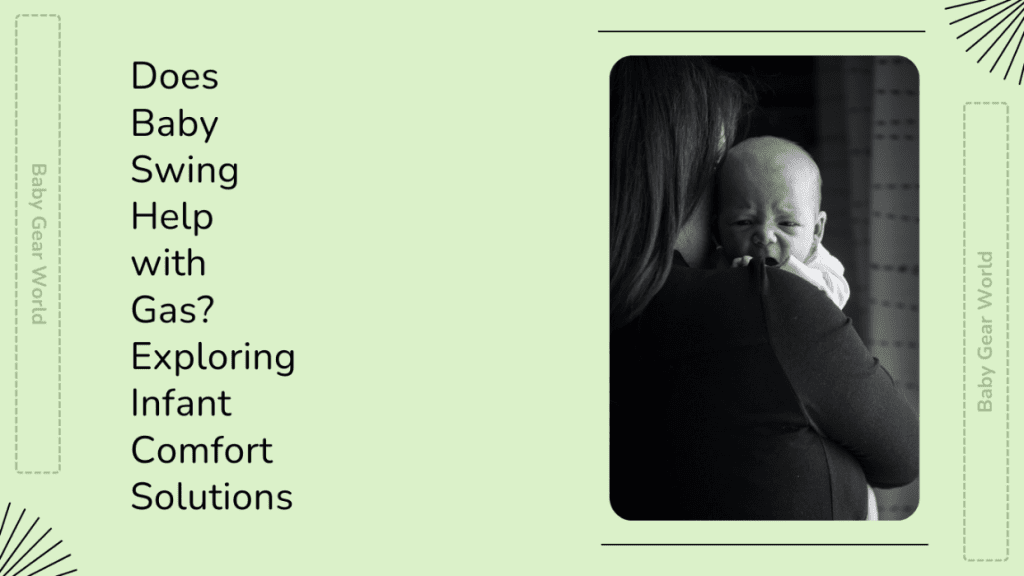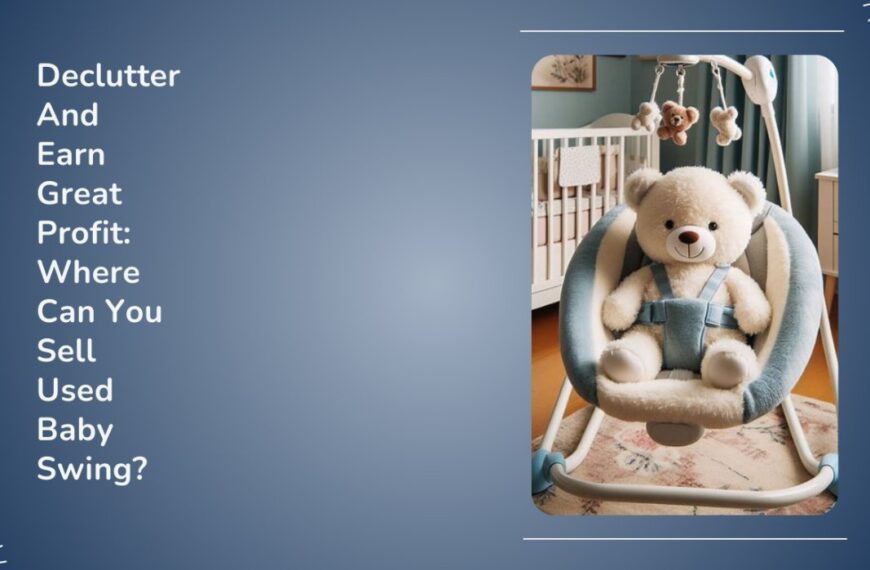Are you drained of hearing your baby cry and looking for a solution to cure the baby’s gas problem so both of you can rest peacefully?
Since you are here, you might be considering a baby swing as a possible solution.
And I guess you might desperately want to know, “Does baby swing help with gas?”
Well, the answer is not very straightforward and needs some explanation but don’t worry, we are here for that.
In this blog post, we’ll discover the truth behind the question, “Does baby swing help with gas”.
We’ll also see Symptoms, Causes, Preventions and Home Remedies for gas issues in babies.
People Also Read: Do Baby Swings Help With Colic
Table of Contents
DOES BABY SWING HELP WITH GAS?
Baby swings can help release gas for some babies by providing gentle motion and soothing stimulation.
However, baby swings are not specially designed to handle babies’ gas issues, so swings can only play an indirect role.
Let me explain how a baby swing might indirectly help with gas:
Soothing Rhythmic Motion
The gentle swinging motion of a baby swing mimics the sensation of being rocked in a caregiver’s arms.
This rhythmic motion can help calm and relax a baby, which can ease muscle tension and promote the natural movement of gas through the digestive tract.
Stimulation of the Digestive System
The motion of the swing might stimulate the baby’s digestive system. It can help the muscles in your baby’s gut squeeze and relax in a regular way.
This can help the food and gas move along the digestive tract.
Comfortable Positioning
Many baby swings are designed with a slightly reclined position, which can help alleviate pressure on the baby’s abdomen and allow gas to move more freely within the digestive system.
Distraction from Discomfort
Babies experiencing gas misery might find relief through the distraction provided by the swinging motion.
The enjoyable motion can help shift the baby’s focus away from the discomfort of trapped gas.
Relaxation and Sleep Promotion
The calming effects of a baby swing’s motion can help babies relax and potentially fall asleep.
During sleep, babies often change positions, which can further aid in releasing gas.
Babies feel relaxed in baby swings which can reduce their crying period, preventing them from swallowing more air and worsening their gas pain.
But babies are different, and what works for one may not work for other.
So baby swing can be helpful in some cases, but also try other well-known remedies for quick recovery like burping, massaging, bicycling, or using gas drops.
SIGNS AND SYMPTOMS OF GAS DISCOMFORT IN BABIES
How will you find that your baby has gas issues and not something else bothering him?
To overcome this problem, parents should be aware of symptoms of a gassy baby.
Crying and Fussiness
If your baby is suddenly more irritable, crying more than usual, and difficult to console, gas discomfort could be a culprit.
Frequent Squirming and Restlessness
Does your baby seem restless, constantly squirming and shifting positions?
This could indicate an attempt to find relief from the trapped gas.
Pulling Legs to the Tummy
If your baby frequently pulls their legs up toward their tummy or curls into a fetal position, they might be trying to alleviate discomfort caused by gas.
Tummy Tightness or Bloated Appearance
If the baby’s tummy feels abnormally firm or distended, it could mean that they have gas trapped inside.
Excessive Burping
While occasional burping is normal, excessive burping, especially after feeding, might indicate the need to release gas.
Interrupted Sleep
When your baby has gas pain, it can make them wake up more often and have trouble sleeping well during naps and at night.
Decreased Appetite
If your baby seems less interested in feeding or pulls away from the breast or bottle mid-feed, gas discomfort might affect their appetite.
Difficulty Settling After Feeding
If your baby has trouble settling down after feeding and seems uncomfortable, gas might contribute to their restlessness.
COMMON CAUSES OF GAS IN BABIES
Let’s look at some common causes of gas in babies so you can avoid them and save your baby from gas problems.
Swallowed Air
Babies are still learning how to coordinate their sucking and swallowing during feeding, which can sometimes lead to them swallowing air.
This air can become trapped in the digestive system and contribute to gas.
Lactose Sensitivity
Some babies may have difficulty digesting lactose, a sugar found in milk, which can result in gas production.
Immature Digestive System
A baby’s digestive system is still developing, and certain foods may be harder to digest, leading to the produce more gas.
Formula Choice
The type of formula you’re using can impact gas production.
Some babies might be more sensitive to certain ingredients in the formula, leading to increased gas.
Position During Feeding
The way your baby is positioned during feeding can impact the amount of air they swallow. Improper positioning can lead to increased gas.
Teething
The teething process can cause babies to swallow more air due to increased drooling and mouthing behaviors.
PREVENTIONS TO AVOID GAS DISCOMFORT
Gas discomfort can make your little one fussy and uncomfortable, but there are some steps you can take to minimize the chances of it occurring.
- When breastfeeding, ensure your baby latches properly to reduce air intake.
If bottle-feeding, use slow-flow nipples to pace the feeding and minimize gulping. - Gently burp your baby during and after feeding to release the trapped air.
- Keep your baby in an upright position during and after feeding to help prevent air from being trapped in the stomach.
- If using formula, consult your pediatrician to find a formula that agrees with your baby’s digestive system.
- Pay attention to your baby’s cues and avoid overfeeding, which can lead to excess gas production.
- If breastfeeding, pay attention to your own diet and identify any foods that might be causing gas in your baby.
Remember that every baby is different, and it may take some trial and error to find the strategies that work best for your little one.
Follow these precautions and try to find out what works for your baby and stick to that method.
HOME REMEDIES AND TECHNIQUES FOR RELEASING GAS IN BABIES
There are some home remedies you can try to help ease to baby’s gas discomfort:
Tummy Time
Place your baby on their tummy for short durations while they’re awake to help release trapped gas.
Bicycle Motion
Gently move your baby’s legs in a bicycle motion to encourage the movement of gas through the intestines.
Gentle Tummy Massage
Using your fingertips, gently massage your baby’s tummy in a clockwise motion to aid digestion and ease gas.
Soothing Baths
A warm bath can help relax your baby’s muscles and relieve gas discomfort.
Comforting Sounds and White Noise
Gentle, rhythmic sounds or the white noise of a baby swing can distract your baby from discomfort and help them relax.
Offer Distractions
Engage your baby with gentle play, soothing music in a baby swing, or a favorite toy to divert their attention from discomfort.
Swaddle Your Baby
Swaddling can provide a sense of security and comfort, which might help ease gas-related fussiness.
Gas discomfort is usually not considered a major issue and is mostly cured by these home remedies.
However, if your baby’s gas discomfort persists or worsens, consult your pediatrician for further guidance and support.
FINAL WORDS
In conclusion, baby swings are not specially designed for gas relief, but they can play an indirect role in helping your baby cope with gas discomfort.
Baby swings can provide gentle motion and soothing stimulation that can help babies relax and reduce crying, preventing them from swallowing more air and worsening their gas pain.
Baby swings can also mimic the rocking motion that babies experience in the womb, calming their nervous system and easing their digestion.
However, baby swings are not a substitute for other remedies for baby gas relief, such as burping, massaging, bicycling etc.
These methods can help move and expel the trapped gas in your baby’s belly more effectively.
If these home remedies don’t work for your little one, consult your pediatrician and follow his guidance.
Related Blog Posts





